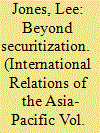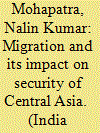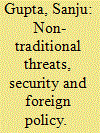| Srl | Item |
| 1 |
ID:
106462


|
|
|
|
|
| Publication |
2011.
|
| Summary/Abstract |
Since the late 1980s, the scope of security policy has widened dramatically to encompass a wide range of 'non-traditional' threats. Southeast Asian states have superficially appeared to embrace this trend, broadening their security discourse considerably. However, they are also often criticized for failing to translate this discursive shift into concrete regional cooperation to tackle these new threats. This article critiques the dominant theoretical framework used to explore the widening of states' security agendas - the Copenhagen School's 'securitization' approach - as unable to account for this gap due to its fixation on security discourse rather than practice. Drawing on state theory and insights from critical political economy, the article argues that the scope of regional security policy is better accounted for by the distinctive nature of state-society relations within Southeast Asia. The argument is advanced using case studies of Southeast Asian states' policies toward Burma, environmental degradation, and border conflicts.
|
|
|
|
|
|
|
|
|
|
|
|
|
|
|
|
| 2 |
ID:
120732


|
|
|
|
|
| Publication |
2013.
|
| Summary/Abstract |
Migration is emerging as an important source of threat to the peace and security of Central Asia. This is happening, notwithstanding the fact that this region is receiving substantial amount of external remittance. Apart from lack of economic opportunities, existence of blurred boundaries, emergence of authoritarian regimes with a tilt towards strong 'ethnic state' as well as the alienation of substantial number of population are contributing to the process of flow of illegal migration. This results in loss of young population, growing ethno-nationalistic conflict, spurt in religious terrorism, proliferation of narco-trafficking as well as HIV/AIDS in this region. These above-mentioned threats are generating a lot of 'insecurity' in Central Asia. The best way to meet the challenges posed by migration is to ensure 'sustainable security' in this region by adopting a broader approach ranging from cooperation among the states of this region so also to ensure human security at the ground level.
|
|
|
|
|
|
|
|
|
|
|
|
|
|
|
|
| 3 |
ID:
116084


|
|
|